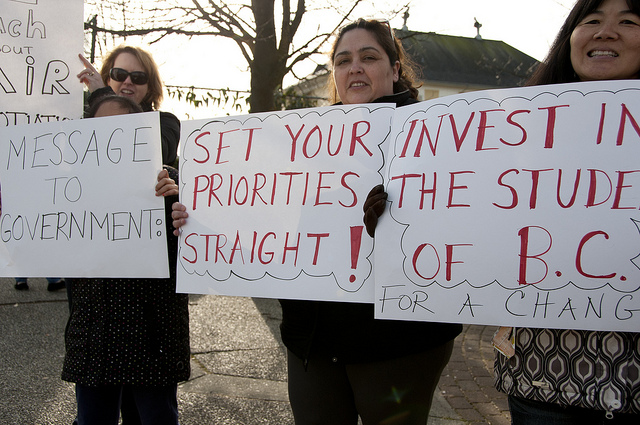Like this article? rabble is reader-supported journalism. Chip in to keep stories like these coming.
The British Columbia Teachers’ Federation (BCTF) announced this week that Glen Hansman will be its next president. Labour reporter Teuila Fuatai spoke with the Vancouver elementary special education teacher about his plans for the next few years.
This interview had been condensed and edited.
What will be your first campaign as head of the BCTF?
Beginning preparations for the next round of negotiations in 2019 is a major focus for the BCTF this year. When I take over from Jim Iker in June, we will be halfway through a six-year collective agreement.
The federation has identified addressing gender inequality at the negotiating table as central to our planning and training over the next three years. As nearly three-quarters of our membership are women, we want to have bargaining teams that are more reflective of this.
To do this, we plan to implement initiatives aimed at recruiting women all over the province at different stages in their careers to train and become active participants in the bargaining process.
The B.C. provincial election is due to take place next spring. What issues will the BCTF be pursuing during the campaign?
Raising awareness around the lack of education funding in B.C. will be the main priority. The current Liberal government has repeatedly advertised budget changes for education as funding increases, however these increases have failed to match inflation. Even though the budget may have increased in actual dollar amounts, the amount available to spend on students and classrooms has decreased.
As a result, services for kids have been cut, staff layoffs have been handed out and schools have been closed. This has had a devastating effect on families, and further eroded the social safety net dependant on a healthy public education system.
It is crucial that education funding be raised to a reasonable level to prevent further school closures, particularly as enrolment numbers continue to increase across the province.
In addition to this, the BCTF also plans to focus election campaigns on child poverty, the teaching conditions of our members and the learning conditions of students.
What do you think needs to be done to address B.C.’s growing child poverty problem?
The election of a government willing to address how children are affected by the widening disparity between the “have and have nots” in the province will be the first step in tackling this.
While the BCTF provides ongoing education for members about the types of issues children living in poverty may face at home, and how it affects classroom learning, no real improvement is likely until political change occurs. Tangible actions, like increasing the minimum wage to $15 an hour and raising welfare rates, to help ensure children live above the poverty line, are able to participate fully at school and grow into productive adults are needed.
What plans do you have to ensure new teachers are engaged with the BCTF?
Staying involved at the local level is an extremely important priority for the BCTF, and is crucial to the engagement of new teachers. B.C. is an extremely diverse province and it’s important that we know what conversations are going on around those staffroom tables and in the classrooms. Feedback from a taskforce that looked at member engagement over the past two years will also assist in creating and maintaining relationships with new members.
Addressing systemic discrimination of Aboriginal children and children of colour in the school system has been identified as a key objective of your leadership. How do you plan to do this?
The BCTF wants a provincially coordinated strategy aimed at tackling systemic discrimination developed. The Truth and Reconciliation Committee report, released last year, made it clear all students needed to learn about the legacy of residential schools, as well as the true history of the relationship between Canada and First Nations people.
Incorporating Aboriginal content and understandings across the curriculum was another recommendation. While some of this work is already underway, the province needs to develop a sustainable approach ensuring teachers are properly trained and equipped to discuss what happened in the past and how it has affected Canada today. Input from local First Nations cultures should also be included.
What do you want to see in the next few years?
Education funding in B.C. needs to be increased to levels comparable with the rest of Canada. At the moment, funding per student is $1,000 below the national average. More funding would result in a wide range of changes benefiting students, including the reopening of school libraries and smaller class sizes. It would also ensure students waitlisted for special education designation assessment would be seen in a reasonable amount of time.
The BCTF legal case seeking to reinstate bargaining rights around class size and composition in our collective agreement is an important factor in B.C.’s education funding debate. Before the rights were stripped away, they effectively guaranteed a minimum level of funding for students because we had control over the student-teacher ratio in classrooms. The appeal is due to be heard in the Supreme Court of Canada in November.
I also want more resources around English language services implemented, particularly in areas where there is a high immigrant population. Increasing education services aimed at assisting refugees should also be considered.
Teuila Fuatai is a recent transplant to Canada from Auckland, New Zealand. She settled in Toronto in September following a five-month travel stint around the United States. In New Zealand, she worked as a general news reporter for the New Zealand Herald and APNZ News Service for four years after studying accounting, communication and politics at the University of Otago. As a student, she had her own radio show on the local university station and wrote for the student magazine. She is rabble’s labour beat reporter this year.



